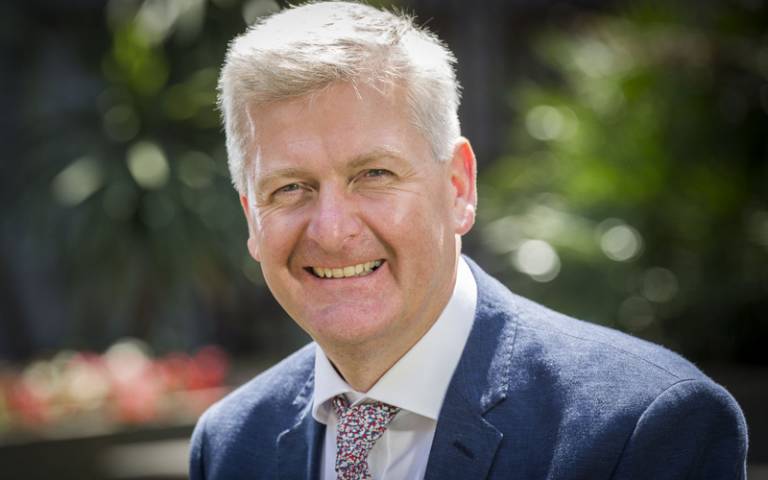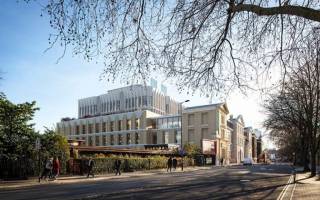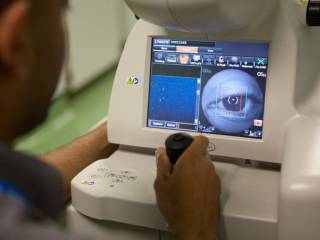Vice Provost's View: Improving health and wellbeing 2019
4 December 2019
Through our research we work together to improve lives and communities and create real world impact, addressing some of the world’s toughest challenges, writes David Lomas, Vice Provost (Health).

As we head towards the end of the year (and the close of voting in the #MadeAtUCL campaign), I’d like to use this Vice Provost View to highlight some of the work that has taken place in health and life sciences over the last year that will translate into direct societal benefit.
Many advances stem from perspectives gained by combining insight from different disciplines. This is something the UCL School of Life and Medical Sciences does particularly well and will continue to exploit, linking to other Faculties within UCL and beyond.
Our commitment to intra-institutional initiatives was demonstrated by the appointment of Alan Thompson and Geraint Rees as Pro Vice-Provosts for London and Artificial Intelligence respectively. These roles are crucial to the pursuit of our 2034 ambitions and I'm excited to see these activities led and coordinated by colleagues with such drive and vision.
Human Immunodeficiency Virus (HIV)
At present, the only treatment for HIV is medication that suppresses the virus. These medicines, which people need to take for their entire lives, pose adherence problems; and in developing countries access to the medicines can be problematic.
Finding a way to eliminate the virus entirely is a pressing international priority so the news that a second person has experienced sustained remission from HIV-1 following stem cell transplantation is extremely welcome. The case comes ten years after the first such case, the so called ‘Berlin patient’ and was led by Ravindra Gupta (UCL Division of Infection and Immunity).
Cancer
Every two minutes someone in the UK is diagnosed with cancer and it remains one of the major causes of morbidity and premature death worldwide. Early detection is essential to help more people beat cancer – a patient’s chance of surviving their disease improves dramatically when cancer is found and treated earlier.
UCL research teams are now part of a new transatlantic research alliance, the International Alliance for Cancer Early Detection (ACED), which is set to develop radical new strategies and technologies to detect cancer at its earliest stage. The UCL ACED centre is led by Mark Emberton (UCL Faculty of Medical Sciences) and hosts 24 co-investigators across UCL and partner NHS trusts, with access to over 200,000 patients for clinical trials.
In London, the largest-ever UK lung cancer screening study began earlier in the year. Led by Sam Janes (UCL Medicine and UCLH), the SUMMIT study aims to improve early detection amongst at-risk Londoners. In addition, the study will provide evidence to inform a potential national lung cancer screening programme.
With 4 in 10 cancer patients receiving radiotherapy as part of their treatment, it is a key component of cancer medicine. The CRUK City of London Centre, led by Tariq Enver (UCL Cancer Institute) will pioneer next-generation radiotherapy research after joining “RadNet”, a network of seven centres of excellence across the UK.
Air pollution and glaucoma
Air pollution has been implicated in elevated risk of pulmonary and cardiovascular disease as well as brain conditions such as Alzheimer’s disease, Parkinson’s disease and stroke. Research led by Paul Foster (UCL Institute of Ophthalmology and Moorfields Eye Hospital) has found that people in the most-polluted parts of the UK were also at least 6% more likely to report having glaucoma, the leading global cause of irreversible blindness, than those in the least-polluted quartile.
Predicting Ebola outbreaks
The latest Ebola epidemic has claimed more than 2,100 lives since August 2018 and while there are signs it is in retreat, the risk of spread is still high according to a recent report by the UN. Researchers David Redding (UCL Genetics, Evolution & Environment) and Kate Jones (UCL Genetics, Evolution & Environment and ZSL’s Institute of Zoology) led a team that developed a model that tracks how changes to ecosystems and human societies combine to affect the spread of Ebola. The model could be used to predict outbreaks of the deadly infectious disease and help policymakers to develop healthcare infrastructure that reduces the risk of outbreaks.

Neuroscience
There are currently no effective treatments to slow the progression of dementia, which affects 850,000 people in the UK, predicted to rise to over one million by 2025. Nick Fox is leading a new programme to test promising genetic therapies for neurodegenerative and dementia-causing diseases. The programme was launched this year thanks to a £5m donation by the Sigrid Rausing Trust.
Conditional planning permission for a new research facility on Gray’s Inn Road has been granted. The facility will bring together clinicians and research teams from different disciplines to tackle the neurodegenerative conditions that give rise to dementia.
Mental Health
Almost half of adults in England have had a diagnosable mental health disorder in their lifetime and there are unprecedented opportunities for us to make a difference in mental health research. The launch of the UCL Mental Health Strategy for delivery via the Institute of Mental Health led by Anthony David will helps us realise this potential.
Health benefits of the arts
The arts can have profound effects on health across the lifespan. Daisy Fancourt (UCL Institute of Epidemiology & Health Care) is co-leading the world's largest study into the impact of arts on physical and mental health. It will review interventions embedded in NHS hospitals, clinics and in the community and assess their effectiveness in improving health and wellbeing.
Daisy was one of the winners of inaugural Health Humanities Medal last year. The list of award winners also included Helen Chatterjee (UCL Division of Biosciences) who was awarded the Health Humanities Medal in recognition of her research into how museums can be beneficial to health.

Artificial intelligence and healthcare
We are only at the beginning of seeing how AI will impact patient care and it is fantastic to see UCL embracing these developments with the launch of the AI for People and Planet strategy.
If there was any doubt about how AI has already started to impact healthcare, these were dispelled by the recent work of colleagues led by Pearse Keane (UCL Institute of Ophthalmology) working with DeepMind Health and Moorfields Eye Hospital NHS Foundation Trust. They have developed an AI system, which can recommend the correct referral decision for more than 50 eye diseases, as accurately as experts.
Health Data
Data is the fuel that drives health research. Health data is increasing in size and complexity and the UK has some of the richest health data in the world. UCL is at the heart of utilising this data to develop a better understanding of diseases.
Our collegiate and collaborative approach means we are part of four out of seven innovative new data centres announced by Health Data Research UK. Being able to access and link health-related data in this way will significantly improve the scale and speed at which we can develop treatments, identify risks and understand the causes of disease.
Driving translational innovation
In order to transform scientific discoveries arising from laboratory, clinical or population studies in a laboratory into potential treatments for disease we launched the UCL Therapeutic Innovation Networks (TINs). These six networks will help to accelerate the development of novel therapeutics. The TINs are an initiative of our successful Translational Research Office led by Jane Kinghorn.
These are just a handful of examples of work taking place across the institution that will have a benefit to society, outside of academia. We contribute to the world in many ways – not only improving health and wellbeing but also enhancing cultural lives, improving environmental sustainability, building economic prosperity and a myriad of other impacts.
I am very proud of our contribution to London, the UK and the wider world. I am also delighted to see us start to be more proactive in engaging the public in a conversation about the role and value of universities in society.
 Close
Close

